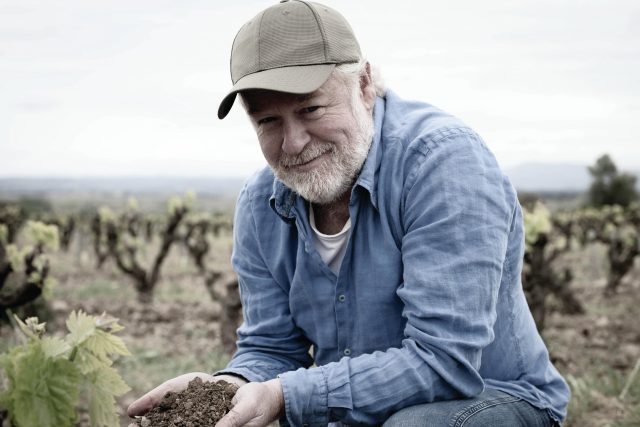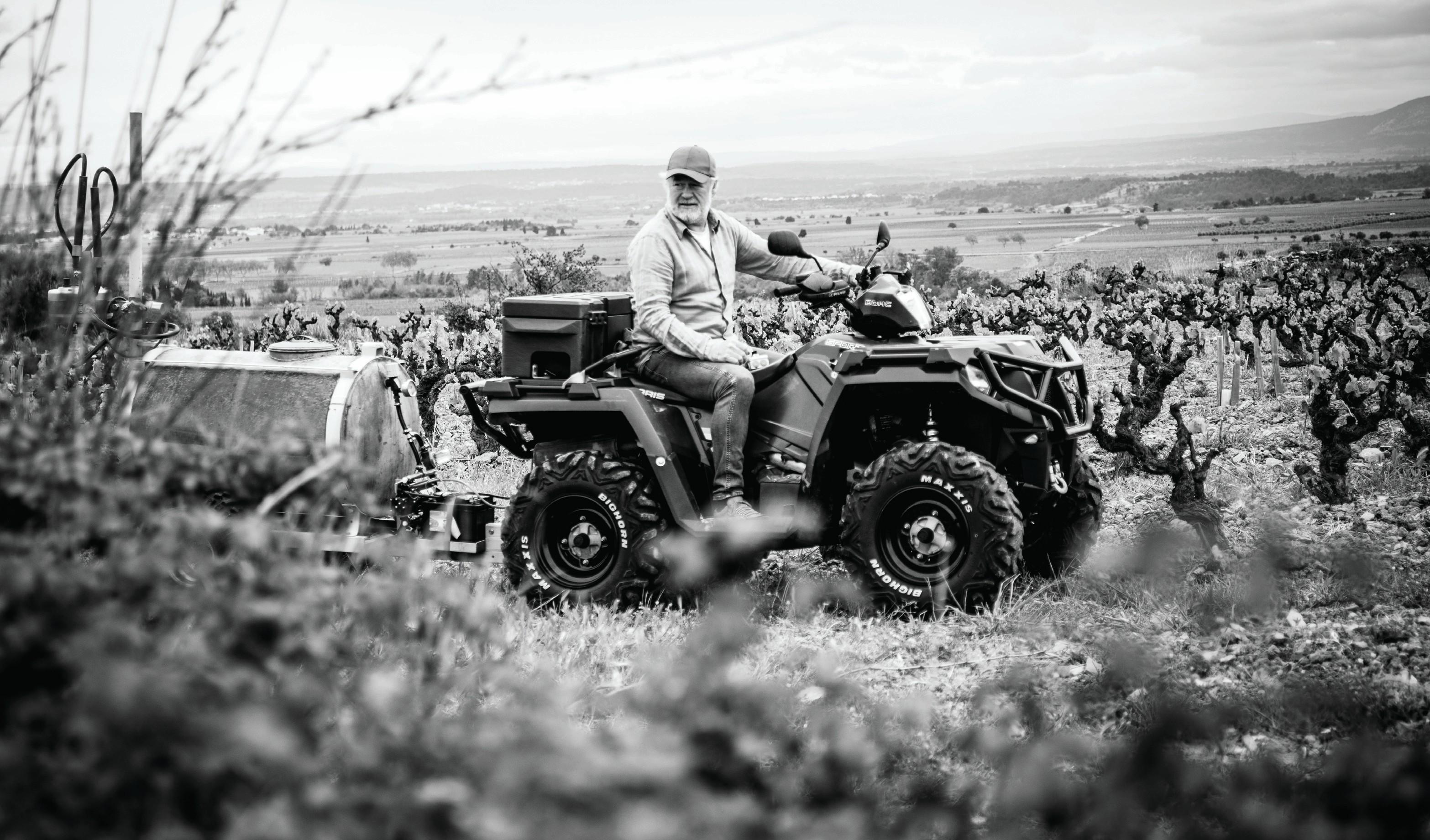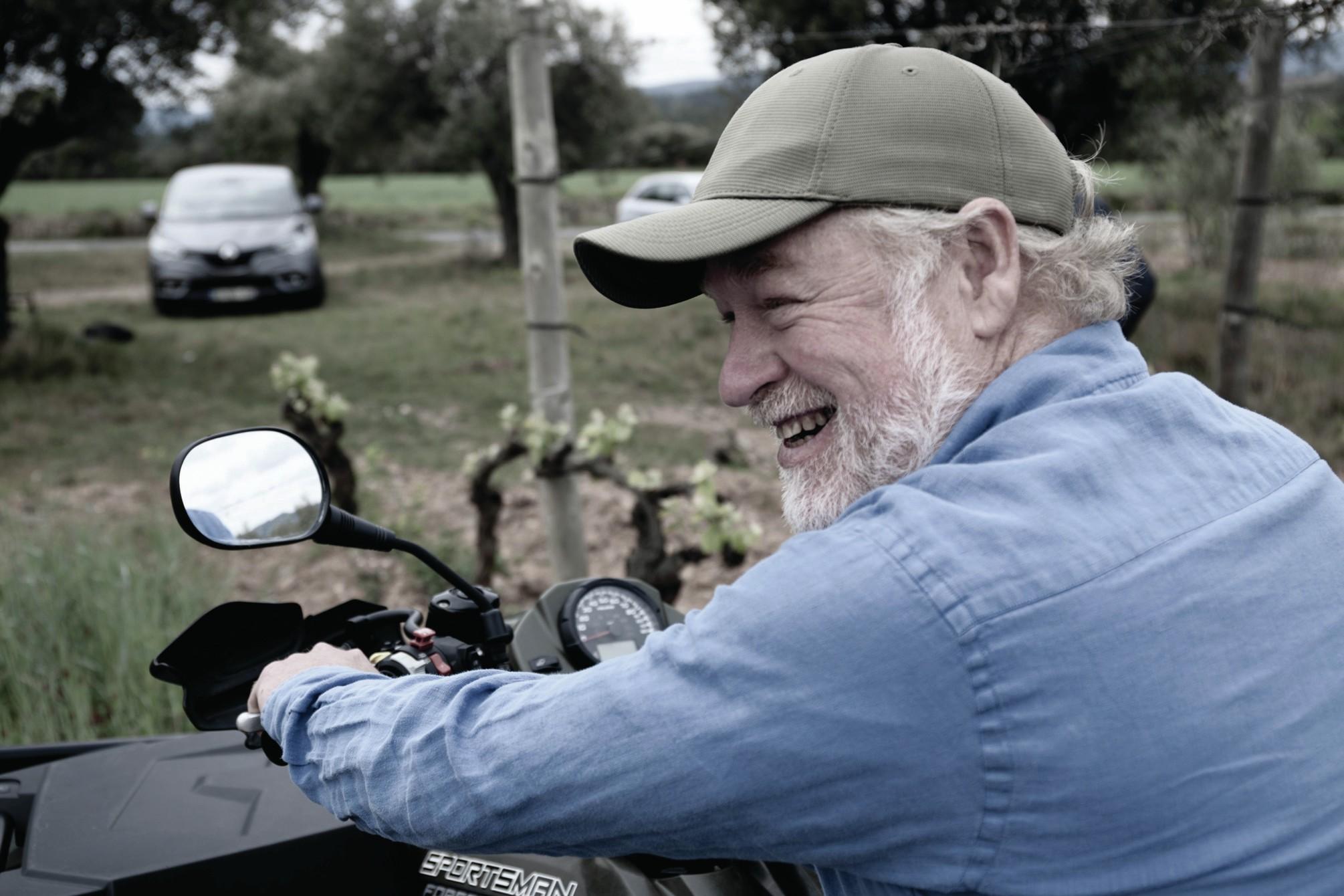The Big Interview: Robert Eden of Château Maris
Château Maris co-owner and winemaker Robert Eden is a passionate advocate of the role of biodynamics in reducing the negative impacts on the environment and the wine industry. Arabella Mileham reports.

When it comes to biodynamic farming, there’s virtually nothing that Robert Eden doesn’t know. In many ways he is an unlikely winemaker – an Englishman whose great-uncle was UK Prime Minister Sir Anthony Eden, but his early interest in wine was encouraged by his father (also an MP), who allowed him to taste wine at a young age.
This took Bertie (as he is known) to the Barossa Valley in Australia aged 17, where he learnt his craft, subsequently working with renowned winemakers in Italy, Spain and California, and serving an apprenticeship with legendary wine broker Becky Wasserman-Hone in Burgundy, before settling in the Languedoc more than 25 years ago, at the 45-hectare domaine of Château Maris in Minervois’ La Livinière cru.
Eden’s geniality, energy and willingness to push the boundaries is clear, along with his passion for making great wine that respects the terroir and the soil without compromise.
Described by Jancis Robinson MW as a “sustainability hero”, his interest in biodynamics was somewhat accidental – he fell into it after purchasing Château Maris in 1997, despite having more than 15 years of wine experience up to that point.
“It was due to bad-tasting grapes, it’s as simple as that!” he laughs, adding that “1997 was a pretty cool vintage in the Languedoc, so I didn’t consider the taste of the grapes too much; 1998 was a great vintage, but the grapes still tasted bad. It was there that we started to understand the correlation between good taste and soil health”.
The best way of rebuilding soil health is to regenerate life back into the soil in the form of compost, which worms help turn into a healthy, live, natural and active fertiliser, creating an ecosystem rather than a sterile environment.
“If you have a live, interacting ecosystem, you’ve got a greater chance of having a high-quality tasting wine,” Eden says.
It took around 20 tonnes of well-ripened cow manure (“an integral part of biodynamic agriculture”) to bring the soils at Château Maris back to life after years of conventional farming and pesticides had “drugged” the soil.
Eden learnt about the art of making biodynamic compost and “infusing the plant-based preparations into a pile of manure according to [Rudolf] Steiner ’s teachings”.
In addition to cow horn manure and horn silica, various teas and tinctures are used to boost the soil and as a foliate spray, such as the über-versatile stinging nettle tea. High in vital nutrients such as calcium, magnesium and natural sulphur, it can stimulate beneficial soil micro-organisms, bacteria and fungi, to promote a healthy soil ecosystem, improve plant nutrition and soil fertility, and enhance the vines’ overall vitality by helping them to build resistance against pests and diseases.
Others are used specifically to stimulate an activity within the plant, Eden explains. Camomile, for example, is a “soil communicator”, primarily used to promote plant health and regulate the decomposition process, by stimulating the activity of soil micro-organisms, enhancing soil health and aiding nutrient availability for the plants.
“You need to have communication in the soil; what is the communicator? It’s fungi,” he says, adding that mycelium, the thread-like network structure of fungi, aids the assimilation of nutrients which have been prepared by different bacteria. Camomile can help stimulate that activity.
“We’re just taking that composition and trying to use it at the right time, in the right way, in order to extract those properties and to share those properties with our culture,” he says.
LEAP OF IMAGINATION
Eden concedes that, with some elements of biodynamic culture, such as the use of the lunar calendar for sowing and planting or “dynamising” the preparations, “you have to allow yourself to take a little leap of imagination”.
He adds: “If you remain within the strict confines of our best-known five senses, I think you’re going to find the cosmic side of biodynamics quite difficult to comprehend or believe.”
However, he undoubtedly has a gift in making some of the more esoteric practices more comprehensible. As Eden explains, biodynamics is about working in a reactive and fluid relationship with other living things – a symbiotic system that takes into account everything around it, rather than reacting to just one aspect in isolation, or following a fixed set of procedures or series of steps.
“In biodynamics we’re no longer the dominant species that controls all; you are part of a system and in being part of that system, you’ve got to be aware of what the other parts are and what they’re doing,” he explains.
“We have to connect with all living forms, all living organisms around us, to be able to judge what we are doing within that space.”
It is a process, Eden says, that respects life forms in its methods, and more than anything “tries to enhance life both above ground and below ground in order to create a healthy ecosystem”.
The hard work Eden has done at Château Maris was recognised when the estate became the first winery in Europe to gain B Corp certification in 2016 (a status enjoyed by only 27 wineries worldwide today) – a gold standard that encourages companies to constantly push the boundaries.
“That’s the beauty of the B Corp certifications – it’s one of the few certifications that actually requires you to progress every year,” he explains.
“You can’t just ‘one box tick’ the certifications every single 18 months; you have to go back to the drawing board to continually demonstrate improvement.”

While “very difficult to actually achieve”, he argues that it’s good to think about your “360-degree impact – if I’m doing this, how does that harm that?” – and adds: “I think we all have to push ourselves forward into finding the best possible way of reducing our negative impact on the planet.”
Château Maris’ hemp cellar is a case in point. The low-impact, gravity-fed cellar is made from “ingenious” hemp bricks that act as “a huge carbon sink”, Eden says, “because it’s just all wood and plants”.
The bricks are made from the waste product of the hemp plant, hemp straw, mixed with lime and a molasses binder, which creates an efficient brick from an insulation and acoustic point of view – the temperature remains 11- 17o C all year round without any heating or air conditioning. The building is powered by solar panels with a roof of living grass and all water is recycled.
Partner Content
The hemp cellar replaced an admittedly efficient but prefabricated concrete cellar with “big, energy-consuming lights and air conditioning system” in La Livinière, which was sold as it was not in keeping with Eden’s philosophy.
“It didn’t correspond at all to what we were practising in the vineyards; it just didn’t make any sense to be doing all of what we’re doing in the vineyard and bringing the result of that into a building which was almost the opposite of that,” he explains.
“As much as possible, I wanted to work from a plant-based building; something which was linked to the energy of the Earth.”

Positive outlook: Eden is optimistic about changing attitudes among growers
SPHERE OF INFLUENCE
But Eden’s sphere of influence now reaches far beyond the boundaries of Château Maris. He is a regular speaker during panel discussions on viticulture – he spoke at the 2015 United Nations Climate Change Conference in Paris (COP 21) on how to reduce negative impacts on the environment and the wine industry.
He also serves on the Jane Goodall Institute Global Board of Directors working to help preserve animal habitats and sustain biodiversity through various channels of the organisation.
Since 2019, he has been a consultant for regenerative viticulture for Cordier by Invivo, a wine subsidiary of French cooperative Invivo Group, which indirectly manages around 50%–60% of all French agricultural land, and its Terra 360 program.
“I participate in the efforts that are being made to farm grapes on a large scale in a sustainable, healthy and regenerative way,” he explains. “It’s a great privilege to be part of the Terra 360 team, as just in the Languedoc Roussillon alone, we are working with 30,000 hectares of vineyards that makes the potential positive impact very high.”
Does he think the industry in general is doing enough?
“Yes, they’re waking up to it,” he says, after a moment’s pause. “Today, a lot of grape growers are more and more conscious of the difficulties that we have in growing grapes, and therefore there’s greater questioning going on. This is coming in the face of climate change, and a more global discussion on soil health and environmental health in general. I think a lot of wine growers are very awake to it and would prefer to grow grapes in a more responsible way.”
He adds: “As much as I loathe it, that transition takes time. I’d love everything to happen right away, but it’s not that easy to implement, especially on a large scale. We have to understand as best we can what we’re dealing with, and that means getting a greater understanding of the condition of our soils today, getting a greater understanding of what our plants need in order to produce an economic yield which also allows us to reduce our impact.”
GROWING DISCUSSION
The great strides made in both soil analysis and plant analysis over recent years have helped here, while other advances include the reduction of fertilizers, use of cover crops and increased discussion about mechanical use: “no-till, till, what to till, how deep to till, etc”, Eden explains.
“All those things have been very positive developments towards more sustainable agriculture.” He explains: “What drives me is the possibility to produce wine with utmost responsibility. We should be making wine in a way which respects the place of origin and translates as much as possible the place of origin in a balanced way.
“I want to make something which allows you to travel to where the wine has been made. Wine that travels is wine to me; wine that doesn’t travel is just a beverage, and that worries me a little bit, especially when you consider how the majority of that is made.”
Eden concludes with a quote from conservationist Jane Goodall. “’Every single day, every single person can make a difference’ – that is just such a wonderful, inspiring, encouraging comment for all of us to listen to. It’s not being the king of the castle, or the top of the hill – it is just doing your own little bit.
“Whether you call it organics, whether you call it sustainable, whether you call it regenerative, I don’t really mind – we’ve just got to do it!”
Château Maris: key facts
• Château Maris has been co-owned by Robert Eden and Kevin Parker, a managing partner of Sustainable Insight Capital Management (SICM), since 1997.
• Located in the village domaine in Minervois La Livinière and extending to 45 hectares, its plots are dotted around the village. Grape varieties grown include Syrah, Grenache, Carignan and Grenache Gris.
• Certifications include Ecocert (2002), Biodyvin (2004), Demeter (2008) and B Corp (2016).
• Every plot is tilled by a horse-drawn plough, harvested by hand and vinified separately, some without sulphur to the end of the maceration process, some right through to just before bottling, while other cuvées are bottled without any sulphur.
• Key markets include the US, where trade is equally split between the on and off-trade; Canada (led by Québec), where the majority goes through the state monopolies; France; the UK, where the market share is allocated to 70% off-trade and, 30% on-trade; followed by Japan, the Netherlands, Belgium and other European countries.
• Armit Wines is Maris’ UK importer, focused on three wines: Les Amandiers, La Touge and Brama.
Château Maris: the wines
In pursuit of “that velvety, luxurious, sensual Syrah” that La Livinière is known for, Eden makes “virtually, single varietals”, he says. “It has lovely white and black peppers, some spiciness and beautiful dark fruit.” Les Amandiers, a cuvée available from Armit, is made of around 95% Syrah, “with maybe 5% Grenache”, and aged for 16 months in new French oak barrels, while La Touge, from vines on the terraces at the foot of La Livinière, comprises 60% Syrah and 40% Grenache, aged in Nomblot concrete eggs and vats for 16 months. A third wine, Les Planels, available at Waitrose stores in the UK, comprises 85% Syrah.
Eden also makes small quantities of a Grenache Gris-based white wine, sourced from vineyards in Brama, high above Félines-Minervois; a wine he describes as “complex, deep, but also very refreshing, zippy and zesty”. Half of it is fermented in 600-litre barrels for 10 months, the rest in concrete eggs for six months, which he says gives the wine a lot of freshness “that you don’t get in the foudre”. Eden explains: “The Grenache is wonderful – it has such an exciting, low pH and a very good brightness. It seems well-adapted to the kind of climate which is going on now.”
Related news
Castel Group leadership coup escalates
For the twelfth day of Christmas...
Zuccardi Valle de Uco: textured, unique and revolutionary wines




